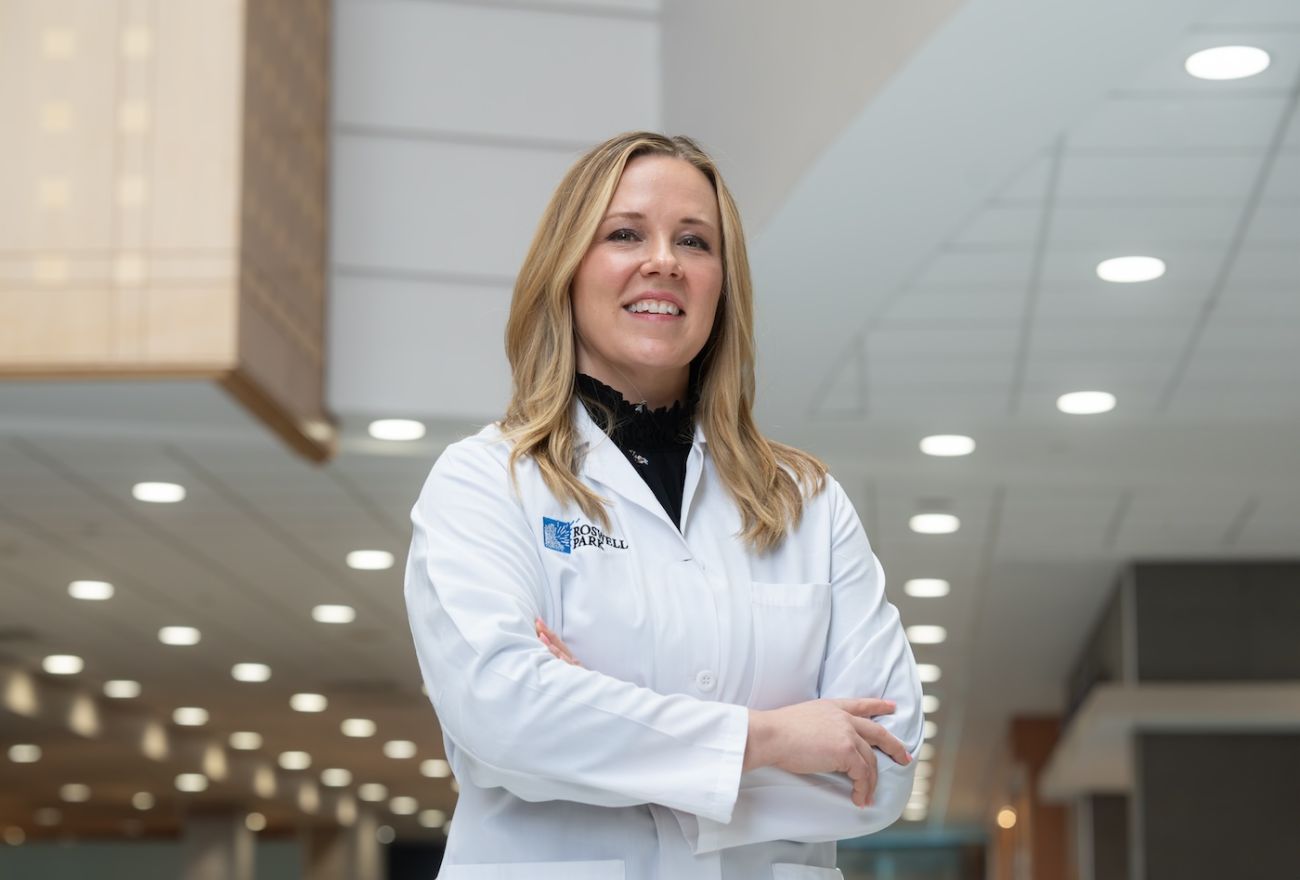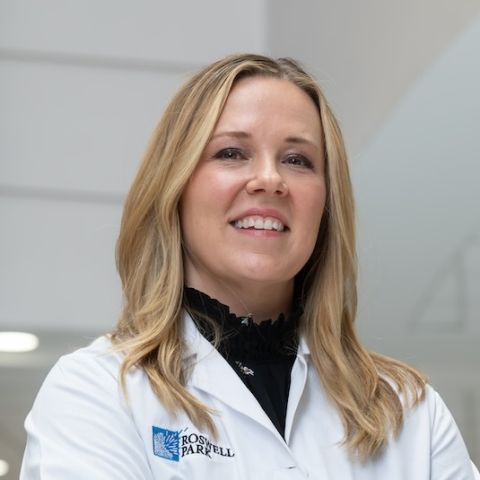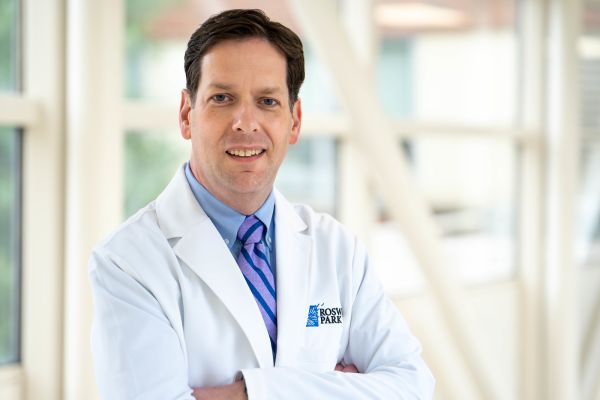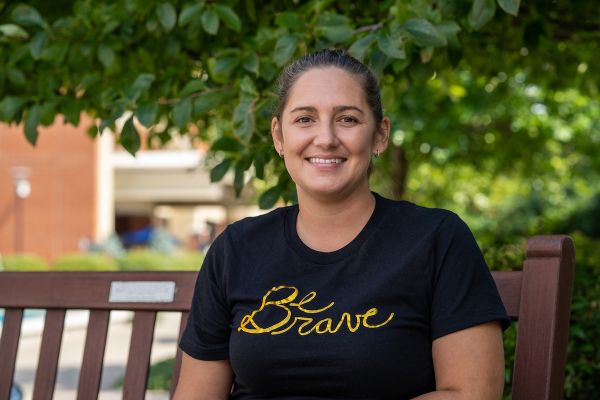The medical realization that changed everything for Shernan Holtan, MD, came with a kick.
Following her training at the University of Nebraska, she decided to specialize in stem cell and bone marrow transplantation, because it combined her interest in infectious diseases, rheumatology, oncology, hematology and intensive care all in one area of expertise.
During work on a clinical trial, while she was pregnant with her first child, a realization came to her about graft-versus-host disease, a potential transplant complication where the transplanted cells cause an over-active immune response.
“I was taking care of patients who had received a matched donor transplant and were dying of graft versus host disease, while I was carrying a fetus who was at best half-matched, and there was no bad immune reaction. This made no sense from the immunology standpoint,” she says. “Why does this happen? I didn’t understand from an immunologic standpoint why this was even possible,” as the unborn child’s DNA was less of a match to her own body’s than some of the patients who were having serious reactions to their transplants.
From there she began to study the immunology of pregnancy, the hormones involved therein and how a woman’s body responds to growing a genetically separate entity. “Fast-forward 17 years and now we’re routinely using pregnancy hormones to treat life-threatening graft versus host disease to help establish immune tolerance and also provide growth factors to help in tissue repair and would healing,” Dr. Holtan says.
From the library to the lab
As a Professor of Medicine and Chief of the Blood and Marrow Transplantation Section at Roswell Park Comprehensive Cancer Center, Dr. Holtan is now part of a powerhouse team leading the center into a bold new future focused on immunotherapy and making groundbreaking discoveries that will lead to more effective, less toxic treatment for cancer patients.
But as a child growing up in rural Nebraska, the library was the center of her world. “My entertainment was the local library. I would check out books about the body. I was completely fascinated with how the body works.”
Those books led to medical school and rotations in, among other things, surgery. “Reconstructive surgery after cancer therapy was just fascinating to me. I did rotations in dermatology, infectious disease, rheumatology, the intensive care unit. I loved all of those things but wasn’t really quite sure what I wanted to do when I grew up.”
Until that day in the lab, working on a clinical trial, pregnant with her son. “It was just absolutely transformative. It was all of my favorite things in one specialty. Beyond that, it was just really hopeful. You got to help patients go through really difficult treatments, difficult scenarios, and help them come out on the other side, hopefully with a cure.”
Why Roswell Park for transplant therapy?
Dr. Holtan is one of many in our team of world-renowned physicians and scientists who were central to historic breakthroughs in cellular therapy.
A bright future ahead
There have been many advances in treating graft-versus-host disease in the past nearly two decades, but Dr. Holtan isn’t slowing down any time soon.
In 2023, Dr. Holtan published the results of two clinical trials aimed at preventing the development of graft-versus-host disease, including the use of cyclophosphamide after transplant, a powerful chemotherapy drug.
“When I was in training, and in the early years of transplantation, around 50% of people would develop graft-versus-host disease. Now, with the use of post-transplant cyclophosphamide, the safety has improved so much, it’s only five, maybe 10% of people developing significant graft versus host disease that’s both acute and chronic. I’ve been excited about the treatments I’ve been developing, but honestly, prevention is where it’s at, now that we have so little severe graft versus host disease. We can focus on some of the bigger issues that remain, such as relapse.”
This progress also opens Dr. Holtan’s time up to studying other approaches to cancer care and treatment that will help improve the quality of her patient’s lives.
“We’re taking it a step further. Can we get away from just immunosuppression and actually use medications that improve immune function? Can we incorporate medications that have direct anti-leukemia effects so we can target relapse as well as graft versus host disease with literally the same drug,” she asks. It might be possible to use new treatments, and new combination of treatments, to improve the acceptance rates and efficacy of transplants.
Using supportive care to improve outcomes
Another area of her research is looking into whether there are non-medical treatments and options for patients. “We’re working on medical innovation, but we also need to pay attention to supportive care,” Dr. Holtan says. “We have some novel approaches that will be used to further study nutrition, strength training, other methods to help support the body and mind through the procedure with the end goal of reducing the time to recover by 50% compared to what is currently the established norm.”
Strength training, as it happens, is another passion of Dr. Holtan’s, a hobby for which she has previously set national and state records for powerlifting. Another passion is music – she used to play bass in a punk band alongside her once-and-current colleague, Brian Betts, MD, and they have both laughed about getting their band back together since joining Roswell Park last year.
Patient care, and improving the options, treatments and long-term survival rates for those who need bone marrow or stem cell transplants, remain the center of her work and what makes her excited to join the team at Roswell Park.
“I love helping patients with really difficult problems. I understand from a personal standpoint how scary a diagnosis of cancer can be,” Dr. Holtan says. “I’m very motivated to help patients and families go through that. I’m excited to leverage the research that we’ve done to make transplants and cell therapies safer, more accessible. Most importantly, I want to see patients succeed, and I want to see them when they’re through with this therapy back to living their life, doing the things they want.”



